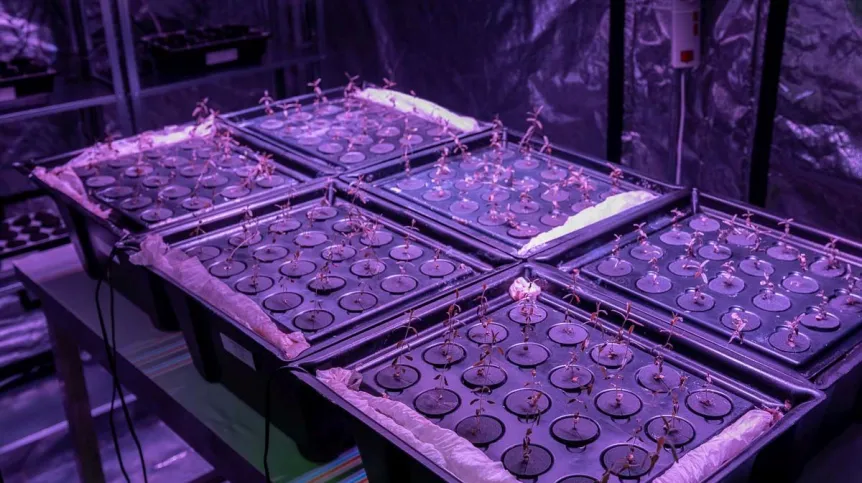
A scientist from the Wrocław Medical University plans to grow Baikal skullcap, a plant used in the pharmaceutical industry, without soil and with less water. He also wants to extract medicinal substances from the root of the plant multiple times.
A scientist from the Wrocław Medical University plans to grow Baikal skullcap, a plant used in the pharmaceutical industry, without soil and with less water. He also wants to extract medicinal substances from the root of the plant multiple times.
'Population growth, global warming, the development of industries that generate environmental pollution and the huge consumption of fresh water mean that alternative cropping options are being pursued around the world. One of them is the cultivation of plants under artificial growth conditions developed by Kajetan Grzelka, a student at the Department of Biology and Pharmaceutical Biotechnology of the Medical University of Wrocław, in the project +Pulse electroporation as an innovative method in the process of the so-called root milking, use in the adaptation of medicinal plant crops in soilless conditions+, supervised by Dr. Sylwester Ślusarczyk', we read in the university press release.
Grzelka explains that the plant used in the study is Scutellaria baicalensis Georgi, Baikal skullcap, an increasingly popular plant in medicine that produces many substances with great therapeutic potential that may become drugs in the future.
'We want to stimulate the growth of the root, which contains the most interesting compounds, and repeatedly extract substances from the same plant', Grzelka says.
When looking for an alternative to traditional soil cultivation, the scientist decided to use the method called aeroponics. In this method, the plant matures in a small container, and a special medium sprinkled on the root hanging in the air is used for its growth. The fact that the root hangs freely not only favours its aeration, but also facilitates its growth.
What distinguishes this method is that the cultivation takes up much less space, which makes it more efficient, does not require soil and uses much less water. In addition, the cultivation conditions, controlled in terms of temperature or humidity, do not require the use of chemicals common in conventional agriculture, such as pesticides that protect plants from pests.
There are currently about 100-120 Baikal skullcap plants in the Botanical Garden of Medicinal Plants of the Wrocław Medical University. They grow in special aeroponic culture trays. The scientist will use them in the next part of the study, in which he will isolate medicinal compounds from the Baikal skullcap root using reversible electroporation.
'It is a stimulation with electrical impulses, thanks to which microscopic holes form in the cells - so-called pores, which close within a few to several minutes after the cessation of electrical stimulation. This promotes the exchange of substances from inside the plant cells with its environment and additionally is a stressor that makes the plant grows faster and increases the amount of active compounds it contains', we read in the release.
'According to the available data, we are the only ones in the world to study the method of aeroponic cultivation of Baikal skullcap, combined with intravital extraction of active compounds using electroporation and special solvents', Grzelka says.
Solvents are used to isolate medicinal substances. Volatile organic compounds such as methanol, ethanol and other compounds harmful to humans and the environment are usually used in plant extraction. Grzelka wants to replace them with natural deep eutectic solvents (NADES).
'We intend to develop a solvent composition that will ensure proper conduction of electrical pulses and isolation of valuable plant compounds, and at the same time will be non-toxic and will not damage the plant. Unlike the conventional extraction method, which involves growing, drying and grinding the material, and then making an extract, we want to extract medicinal substances from one plant many times as it continues to grow. This is the +root milking+ mentioned in the project title', the scientist says.
The success of the new method would mean significant savings in space (e.g. one crop instead of five and the possibility of stacking instead of single surface cultivation), water and plant material. The technology would therefore be greener, more efficient and bring a number of economic benefits.
Baikal skullcap is a perennial plant that reaches 25-60 cm, and has small, blue-violet flowers on the stems. For scientists, its most interesting part is the root, which contains numerous compounds with medicinal and health-promoting properties. Flavonoids (including baicalin, baicalein, wogonin and wogonoside) have anticancer, anti-inflammatory, antioxidant, neuroprotective, antidepressant and anxiolytic effects. These substances are also used to treat diseases of the immune system and the cardiovascular system, in dentistry (e.g. in the treatment of periodontal diseases, such as periodontitis) and in the cosmetics industry, as a component of anti-aging and inflammation-reducing creams. (PAP)
PAP - Science in Poland, Roman Skiba
ros/ bar/ kap/
tr. RL













